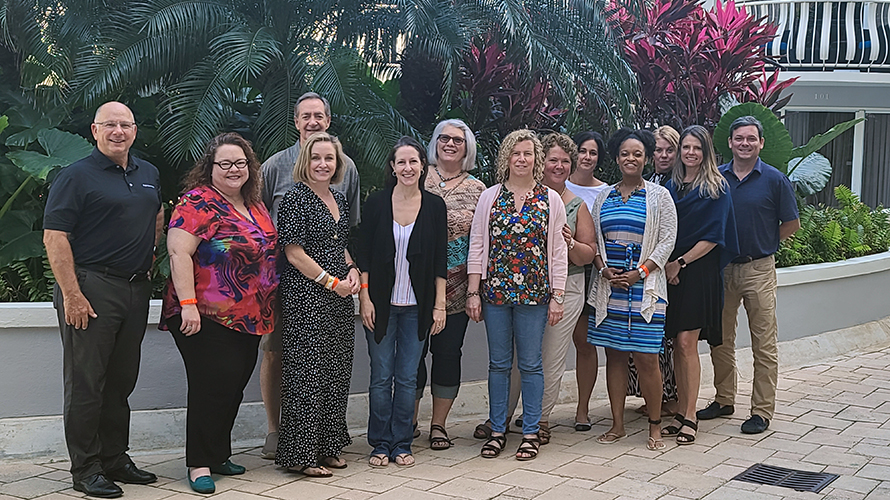Each February, the CPA Consultants’ Alliance (CPACA)—a consortium of 15 leading consultants focusing on the accounting profession—meets to discuss how to improve the profession. During this meeting, alliance members ruminate over issues facing the profession, identify key trends and focus on ways to fine-tune individual advisory practices. This group includes other consultants who focus on:
- Strategic planning
- Human resources and staffing
- Marketing and growth
- Firm cultural transformation
This year’s meeting was held in San Juan, Puerto Rico. As a consultant focusing on information technology and CPA process automation, this meeting expands my understanding of other areas where firms have needs. In addition to expanding individual awareness and conducting strategic planning, specific sessions targeted:
- DEI (diversity, equity and inclusion) initiatives
- PE (private equity) impacting accounting practices
- Firms adopting unlimited PTO (paid time off)
While everyone hears and interprets information differently, below are my takeaways on those three topics.
Implementation of DEI Initiatives to Expand Staffing
With staffing remaining a critical concern within firms, CPACA members discussed the need for cultural shifts to attract and retain employees. The profession has accepted the addition of remote workers, offshore personnel and non-traditional employees to fill specific needs. However, the group felt that we need to be more open to—and encourage—workplace diversity.
While DEI awareness and initiatives were on the rise two to three years ago, it appears that these initiatives were put on the back burner. There’s a need to reinvigorate discussions around inclusion in the workplace. Alliance members discussed ways DEI initiatives promote progress in creating a diverse workforce, including:
- Designating a Chief Diversity Officer or assigning the role—and responsibility—at the leadership level. This ensures DEI is regularly addressed, including integration with the firm culture.
- Providing DEI resources to ensure initiatives are successful. Resources should include:
- Dedicating time and a budget
- Creating additional activities, such as forming employee resource groups (i.e., working moms, people of color, remote employees)
- Spotlighting individuals expanding the firm’s inclusive culture
- Bringing in consultants and speakers to discuss unconscious bias and to reformulate recruiting efforts to hire and promote a more diverse work environment.
- Learning to conscientiously appreciate diversity, identify unique skills individuals bring to the table and actively work to create a sense of belonging.
One comment that particularly resonated with me was this:
Too often, firms put DEI initiatives into a “single lane” and feel they’re done…that they’ve checked the box. Compassion needs to be in ALL lanes. Power comes from all team members working together, highlighting the importance of being increasingly diverse and inclusive.
Differentiation of Private Equity to Encourage Production
Every week, we seem to read about a private equity (PE) group behind another major accounting firm acquisition.
So, why are PE groups targeting accounting practices?
The reality is that accounting firms are overwhelmingly small and medium-sized businesses compared to corporate America. And they’re very predictable since they’re consistently making money. PE sees the accounting profession as ripe for consolidation, along with forced standardization and efficiency—the environment where PE firms thrive.
Many years ago, PE made a play for the profession by buying out 100% ownership of firms to increase revenue with growth and streamlining operations. Overall, these early forays were viewed as failures as key senior personnel took the money and ran (admittedly an oversimplification).
However, this time around, PE firms are taking a different tact. They’re buying between 20-70% of the firm and keeping key personnel on the hook with stock options and other incentives. What’s the key differentiator this time around? High producers are rewarded, encouraging poor performers to leave.
This allows productive firm personnel to get payouts every five years, rather than following the traditional partner track: buying out the owners and hoping for the big payout at retirement.
Also, it’s important to note that it’s not only PE firms that have noticed the accounting profession. Institutional investors, pension funds, wealth management groups and other long-term venture capital groups have started dipping their toes in the water. Future practice models could be in for a real change.
Ascension of Unlimited PTO
Unlimited PTO is another trend that is spreading through the profession. CPACA members shared the two biggest impacts they noticed:
- Personnel taking too much time off
- Personnel not taking what they would normally have taken with traditional fixed/earned PTO
Firms with successful adoption of unlimited PTO have installed guardrails around what is acceptable:
- Taking no more than two weeks in a quarter
- Limiting overlap with key team members to ensure consistent client service
- Understanding that measurable work goals are met
- Planning ahead and delegating for uninterrupted client service
One of the key concepts discussed was understanding the difference between actual time off and time “flexing.” Flexing is when individuals work early, late or on weekends so they can attend kids’ activities, doctor appointments or take care of personal matters.
My CPA Consultants’ Alliance Experience
I’m always amazed by the variety of topics discussed and the breadth of knowledge shared by the CPA Consultants’ Alliance. We aim to make each of us better consultants to the accounting profession. This highlights the importance of taking time outside of your regular work environment to be open to learning and new experiences.


